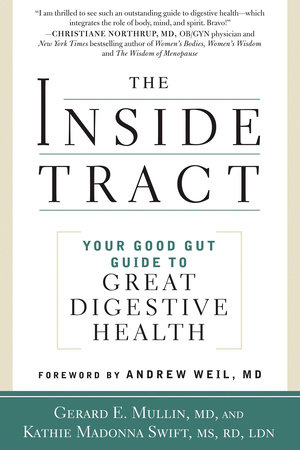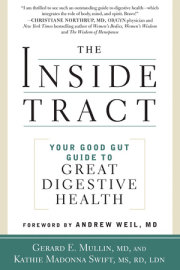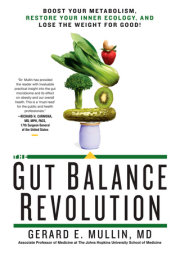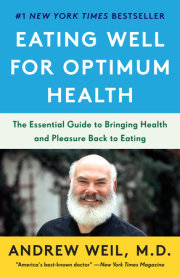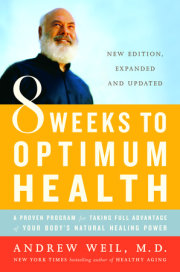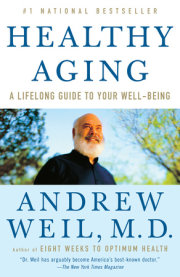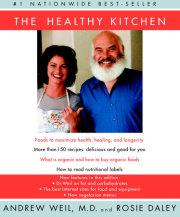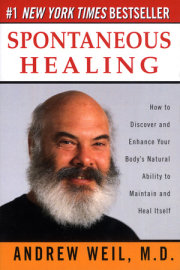CHAPTER 1THE GUT: YOUR "INSIDE TRACT" TO HEALTH AND WELLNESSEveryone has a doctor in him or her; we just have to help it in its work. The natural healing force within each one of us is the greatest force in getting well. —Hippocrates
This book is about your gut.
No, we aren't talking about those extra inches around your middle. We're talking about your alimentary canal, your gastrointestinal (GI) tract, your inner core of life, your inside tract to health and well-being.
We know it's a hard sell. Most people have an almost overwhelming aversion to contemplating their gut—one that borders on absurdity, when you stop to think about it.
After all, we revere the hard work our hearts do for us, and our culture feeds us endless rhetoric on how important it is to protect your heart with diet, exercise, and a healthy lifestyle. We love our hearts. There is something downright romantic about the pump of life—that muscle that beats 72 times per minute and will contract approximately 2.5 billion times before it pumps its last pump and finally stops speeding our blood through their vessels. What a lovely and refined organ! What a powerhouse! What a masterful example of evolution!
And the brain? We have a nearly mystical appreciation for the human brain. We worship those 2 lbs of custardlike gray matter that resides between our ears more than we do any other system in the human body. Admittedly, it is impressive and more than a bit mysterious. Despite centuries of scientific analysis, the inner workings of this seat of human cognition and consciousness are still not particularly well understood. Indeed, the brain is a marvel of creation—one that most likely holds some of the most profound secrets about what it means to be human.
If you're like most people, you would probably be apt to ponder the inner workings of many organs and bodily systems before you would think about your gut. You may look out for your skin by staying out of the sun, contemplate the mechanisms by which your reproductive system works, or be held in awe of the complexity of your eyes, ears, nose, or tongue.
You know that the health of these various parts and systems determines much about your quality of life, and you are likely vigilant in caring for them. You may visit eye doctors and dentists annually and carefully consider the latest dietary information the media feeds you regarding heart health, but few people put that kind of energy into their gastrointestinal tract, much less become intimate with the way it functions and the impact it has on their overall health and well-being.
The result is that your inside tract often goes ignored—in some cases, until it's too late.
Perhaps we ignore the gut because its job is so gritty. Or maybe it's because we are in constant contact with it on a daily basis, so we forget it's even there—like that unrecognized employee at the office who's a real workhorse but is taken for granted. Your days revolve around your gut. You eat during the day to satisfy its hunger. You go to the bathroom to excrete the waste it creates. It's the center of your world in many ways. But it's so easy to simply let it slip one's mind.
It could also be that our society has drawn us away from the gut. People these days turn up their noses at the idea of gut instinct. We eat a Standard American Diet—SAD—that puts the gut in constant peril. (You'll learn more about this in Chapter 4.) We are practically encouraged to beat up the gut with excess antibiotics, toxic chemicals, stress, lack of exercise, and any number of other poor lifestyle choices our world makes it all too easy to embrace and very difficult to avoid. Maybe we just can't face how much we torture the poor gut.
Whatever the case, most people tend to ignore GI function. And we are all suffering because of this ignorance.
As we will explain a little later in this chapter, digestive disease has reached epidemic proportions in our society. A minimum of 60 to 70 million people suffer from some kind of digestive disease, and research presented later in this chapter suggests that even more are suffering. Seventy percent of Americans either have a digestive disease or will suffer with digestive symptoms over their lifetime. According to a study produced in 2004 by the American Gastroenterology Association, the estimated cost of digestive diseases was $141.8 billion. Digestive disease costs in 2004 accounted for 10 percent of all health care spending in the United States ($1.9 trillion, 16 percent of its gross domestic product).
This figure will not come as a shock to you if you are one of the 60 to 70 million Americans who suffer with digestive disorders. But did you know that unhealthy gut function has been linked to a multitude of other diseases and chronic health conditions as well?
What's more, an unhealthy gut has been linked to a plethora of systemic symptoms including headaches, skin conditions, joint and muscle pain, allergies, asthma, menstrual pain and irregularities, and more. Even mental illnesses like depression have been linked to gut dysfunction.
Is it possible that a part of us that's so often ignored by our culture could be the very seat of health and disease prevention? Is there really a connection between gut health and our day-to-day lives? If there is, how can we get back in touch with this inside tract to health and well-being so we can thrive once more?
In this book, we will revolutionize the way you understand health and well-being. The simple truth is this: Your gut is at the center of your being in every way imaginable. Heal your gut and you will be on the superhighway to health.
The Inner Tube of LifeThe average adult human is, in essence, a 30-foot-long tube that starts at the mouth and ends at the anus. The inner lining of this tube—the gut—is your interface between the outside world and the world within.
Perhaps most importantly, your gut is the place in your body where food is broken down into its constituent elements so it can be processed and turned into the vitamins, minerals, and energy you use to live every single day of your life.
On the surface, this sounds pretty mundane. Not many people are awed by the idea that their gut digests food. You eat, it goes into your stomach, a little acid is poured on it, you get the nourishment you need, and the rest goes into the toilet. That's the end of the story, right? What's so special about this?
What's funny (and sad) is that we have become so disconnected from our inside tract that most of us believe this is essentially all that happens when we eat food. We've lost touch with the wondrous transformation that occurs when other living beings (plants and animals) that were nourished by the sun and the earth give their lives to provide us with the energy we need to live.
Consider that human beings eat a more varied diet than virtually any other species on the planet. Over tens of thousands of years, the human digestive system evolved so that it could consume millions of different species. We go around eating pretty much anything we want to all day long, and we don't even have to think too much about it. (Or at least we don't think we have to! Later on you'll learn why being attentive to what you eat should be one of your biggest priorities.)
Besides breaking down food into its constituent elements and then using those vitamins and minerals to fuel your body, your gut also acts as the first line of defense against microbes and intrusive invaders: viruses and bacteria that make you ill. Seventy percent of your protective immune system cells and antibodies live in your gastrointestinal (GI) tract, and they work hard every day to keep out foreign cells that would leach out your life force.
To accomplish these tasks, your GI tract supports an entire ecosystem of its own. Trillions of bacteria live inside your gut. Most counts suggest that there are about 500 different species of bacteria living in there and that the average healthy adult carries 5 to 8 £ds of "flora" inside them at all times. The total number of bacteria in your gut exceeds the number of cells in the rest of your body by a factor of 10. In a strange way, we are more bacteria than human—more bug than human. An entire universe of beings lives inside us. This "microflora" is like an organ within an organ—an undiscovered country of organisms that live in harmony with us.
Under normal, healthy conditions, these bacteria are "friendly" helpers that assist us in the task of living. They have a number of important jobs that we will discuss in detail later in this book, but one of their main functions is to help you digest and process the foods you eat. Chewing, stomach acid, and even enzymes by themselves don't do the trick; we need our little symbiotic friends to helps us transform our victuals into the vital substances needed for our bodies.
Your gut provides a safe shelter for these "friendly" bacteria. However, the sanctity of their home is constantly being challenged by pathogens, aka "bad" bacteria that would very much like to take up residence there. In this war for space, the army that's getting fed the best typically triumphs. When you eat too many poor-quality foods that are filled with sugar and low in fiber (foods the "bad" bugs thrive on), take too many antibiotics, or don't get enough exercise, you set the stage for the microbial terrain of your gut to shift in unhealthy ways. The "bad" bugs overtake the "good" bugs, and the results can be harmful to your health.
Copyright © 2011 by Gerard E. Mullin, MD, and Kathie Madonna Swift, MS, RD, LDN. All rights reserved. No part of this excerpt may be reproduced or reprinted without permission in writing from the publisher.

